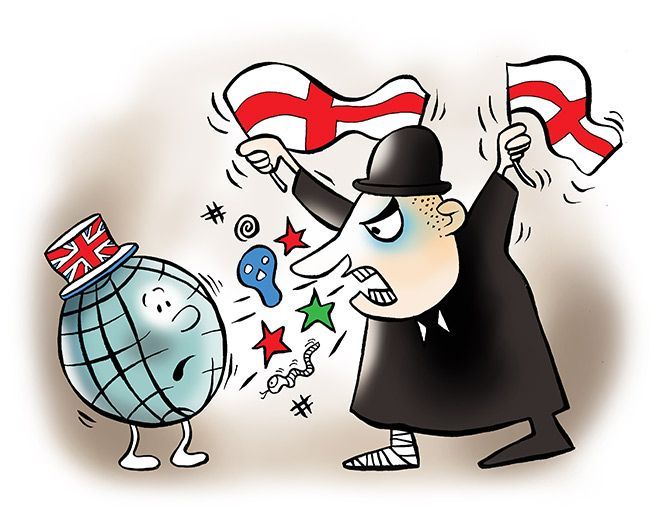After Brexit, ethnic minorities in Britain worry about their future, notes Sunil Sethi.
Illustration: Uttam Ghosh/Rediff.com

Online video clips of post-Brexit racist abuse may be blurry, but the message is graphic.
People are seen hurling abuse at strangers in streets. As police escort the faithful into a mosque, protesters hold aloft English St George's Cross flags and shout anti-immigrant slogans.
One man, with a slightly foreign accent, is heard shouting back, 'This is my country, too… I was born here.'
Racist graffiti -- 'Leave the EU -- no more Polish vermin' -- appears on Polish homes. And shocked Asians post tweets like 'Mum got called "Paki" for the 1st time in 40 yrs.'
Brexit jokes in India are both withering and tasteless. 'Okay Britain, you can keep the Kohinoor. After Brexit you guys are going to need the money.' And 'Will Brexit be followed by Immi-exit?' implying that immigrants' exit is now imminent.
Last summer on Election Day, I visited a few polling stations and found the mood optimistic -- Scotland had stayed in after its referendum a few months earlier and David Cameron won a decisive second term. It's goodbye to all that since June 23.
A British journalist friend, proudly Scottish but resident in London since the 1970s, gave an example last year of the city's robust multi-culturalism: "In some London state schools," he said, "You can hear 26 languages spoken and many are taught."
This week his e-mail reads: "It's by far the biggest British crisis of my lifetime -- bigger than anything since 1939. I wake up every morning hoping it hasn't happened and cursing David Cameron for his arrogance and utter ineptitude. If I were younger, and if the weather were better there, I'd move to Scotland."
"The caricature of the retired English colonel, living in Cheltenham, used to have him say 'When I lived in Poona... I don't want to be such a person... looking at the Clyde and thinking of the gossip in the Academy Club."
It's worrying enough for many Britishers to wake up and find their country in political and financial meltdown, and their loyalties tested, but it's infinitely more troubling for its ethnic minorities in an atmosphere of rising xenophobia.
Immigration has always been a divisive issue and the problem is growing. More than three million Syrians fleeing the country's borders are backed by United Nation statistics.
There were about 244 million immigrants worldwide in 2015, but the number had recorded an increase of 71 million since 2000.
About two-thirds of them live in Europe and Asia. Although the number of people from South Asia and the EU in Britain are roughly the same -- three million each -- the country's foreign-born population more than doubled between 1993 and 2004 from 3.8 million to 8.3 million; the increase in foreign citizens also jumped from two to more than five million in the same period.
British-born or not, polyglot ethnic minorities stick out in visibly large numbers. For many English, the distinction between the Polish plumber and Pakistani takeout-owner, the Indian bank manager and Portuguese nurse has blurred.
Staying on was getting difficult before the Leave campaign won, but it will get tougher.
As The Economist says, 'Britain will be a much less welcoming place.'
A Mombasa-born accountant of Indian origin, who kept her Kenyan passport despite being married to a British national for many years, told me this week that she is now required to take exams in British history and politics -- and insultingly in English -- before becoming a citizen.
"I thought it would make work trips and holidays abroad easier. But after Brexit, who knows? Whose country is it anyway?"
Millions of Nepali and Bangladeshi migrants in India, tied through links of employment and kinship, suffer the same unease. Over generations many have become legally Indian, but, as more keep coming, their presence is fraught with political tensions.
Examples: The Gorkhaland agitation in Darjeeling and the result of the recent Assam election. In Assam, there is a strong demand to create a barrier on the border with Bangladesh, but the long boundary with Nepal is open.
There is no accurate estimate that reflects their number -- there may be anywhere between 900,000 to two million Nepalis in India. It is one of the several imperfections that undermine the Aadhaar project of counting heads.
One thing is certain, though. If they were to go back, a sizeable source of cheap labour would disappear, same as the eviction of east Europeans from Britain. But in India there are shortcuts available. An enterprising Nepali restaurant manager I know in Goa has over the years brought several relatives and found them decent educations and well-paying jobs.
When I last broached the subject of insecurity of tenure he cheerfully said, "Not a problem, sir. You see I'm very friendly with the local police. I have a bank account and proof of residence. They will arrange my Aadhaar card."












 © 2025
© 2025